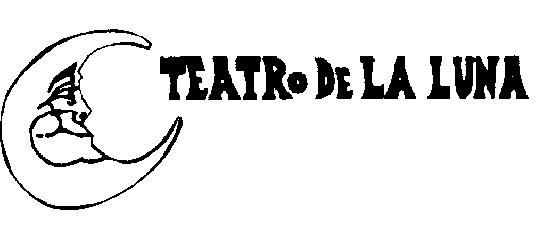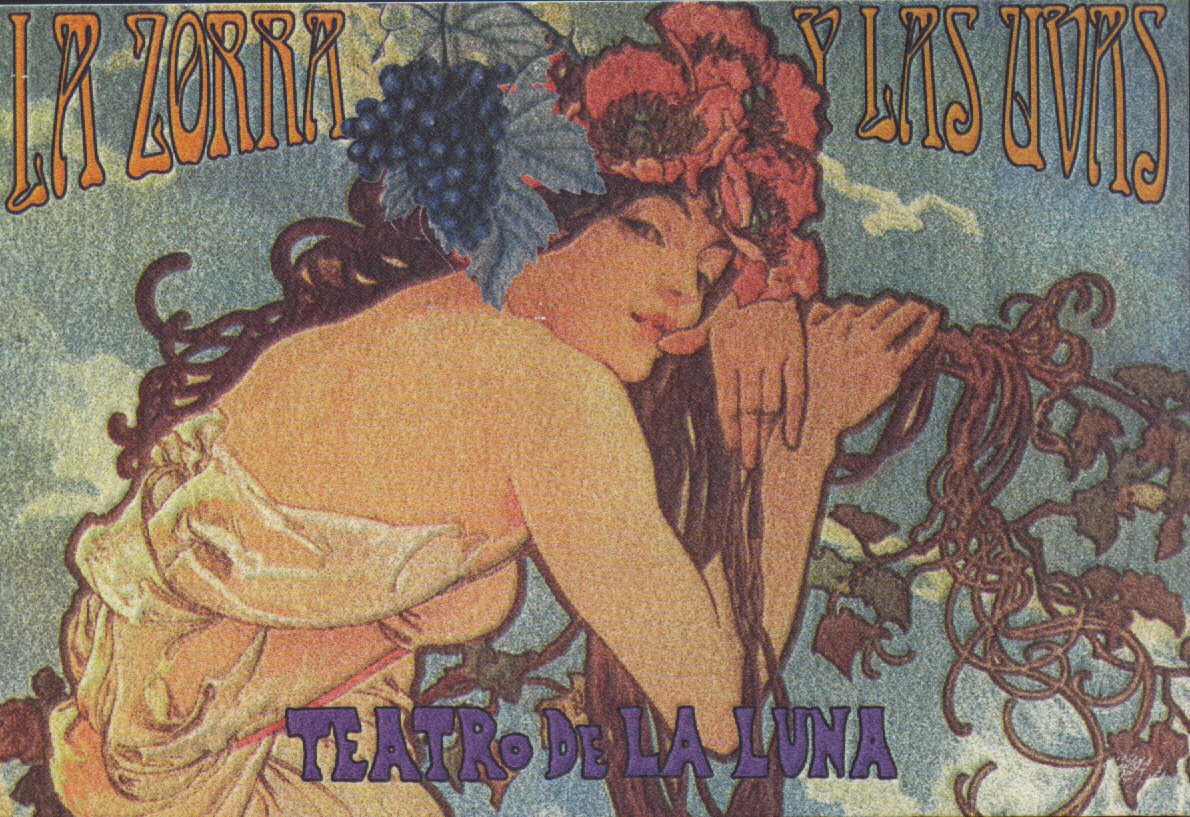
al mejor estilo latinoamericano
with the best latin american flavor
TEATRO
DE LA LUNA
1998-1999 "Rediscovering Our Clasics" Season
Honestily Juana, I Really wanna ~ - The Box of Surprises
The Poetry Marathon "Maratón del Siglo"
~ 2nd International Festival of Hispanic Theater
|
TEATRO DE LA LUNA PERFORMS BRAZILIAN MASTERPIECE
FOR IMMEDIATE RELEASE
CONTACT: NuckyWalder at (202) 882-6227
|
WHAT:
A New Performance:
La Zorra y las Uvas (The Fox and the Grapes)
WHO:
TEATRO DE LA LUNA (THEATER OF THE MOON)
WHEN & WHERE:
FEBRUARY lO-27, 1999
GUNSTON ARTS CENTER -THEATRE ONE
2700 South Lang Street, Arlington, VA
WED-FRI 8pm / SAT 3pm, 8pm
TICKETS:
WEDNESDAY: Pay What You Can
THURSDAY: [8pm] $12
FRIDAY: [8pm] $20
SATURDAY: [3pm] $12, [8pm]
$20
Students and senior citizens: $2 discount on $12-ticket
/ $4 discount on $20-ticket
Student group rates also available
Special presentations:
FEBRUARY 4, 1999 (10 am)
DUKE ELLINGTON SCHOOL OF THE ARTS
3500 R Street, NW Washington, DC
FRIDAY 19, 1999
GUNSTON ARTS CENTER -THEATRE ONE
School hour performances (10am, 1pm)
SERVICES:
Simultaneous English lnterpretation: Friday and
Saturday
Child care: Saturday matinee 3pm (w/reservation)
Free parking
The Theater, the Cast, the Play
|
TEATRO DE LA LUNA, the area's Hispanic theater
"with the best Latin American flavor," presents the masterpiece Brazilian
play . Performances will take
place February 10-27 at THEATRE ONE at GUNSTON ARTS CENTER (2700 South
Lang Street, in Arlington, Virginia).
Playwright Guilherme Figueiredo weaves a bittersweet
comedy for adult and young audiences into this fantastical story that gives
insight into love, life, and freedom. Soon after publishing it in 1953,
Figueiredo received awards from the Brazilian Theatre Critics Association,
and from the Soviet Union Drama and Music Festival in 1957.
Directed by Agustín Núñez
from Paraguay. At Teatro de la Luna, Mr. Núñez has directed
El
Principito (The Little Prince), Lejos de Aquí
(Far From Here) and most recently La Barraca de Federico, four one-act
plays by classic Spanish writers Miguel de Cervantes and Alejandro Casona.
Mr. Núñez's work is "... sassy.. .tickles and instructs"
says The Washington Post while The City Paper writes that
he directs "briskly and with high style." Internationally, Mr. Núñez
has directed for and acted on stage and television, most recently receiving
the distinguished Paraguayan
Mollière Award for Best Theatrical
Director.
Starring as Aesop is CARLOS LEITON CASCO,
most recently known to audiences for his performance in Te Juro, Juana,
Que Tengo Ganas (Honestly Juana, I Really Wanna). He is joined by Teatro
de la Luna's MARIO MARCEL playing the role of Xantos. Supporting
roles are played by CARLA MCKINNEY (Cleia) and ANABEL MARCANO (Melita).
Local actors JAIME CARRILLO (Agnostos) and MICHAEL PRICE (Etíope)
make their Teatro de la Luna debut.
The Fox and the Grapes is made possible
in part by the Arlington County through the Cultural Affairs Division of
the Department of P.R.C.R. and the Arlington Commission for the Arts, the
Cafritz Foundation, the SAL Foundation, The Washington Post, the Washington
Forrest Foundation, and individual members of the community.
For student group rates and more information about
this Brazilian masterpiece and other performances in the 1998-99 "REDISCOVERING
OUR CLASSICS" SEASON at TEATRO DE LA LUNA call (202) 882-6227.
Press Night ["Noche de Luna"] Saturday, February
13, 8pm
Members of the Press: Two courtesy tickets
await your call
The Washington Post has praised Teatro
de la Luna for its "versatility and pioneering spirit" and Bob Mondello,
of The City Paper, commenting on its performances
writes: "How high the moon... [it's] time to
add another company name to the roster of Washington's success stories."
The theater is now in it's eighth season of presenting the best of Hispanic
theatre to the community.
LA
ZORRA Y LAS UVAS
Comedia
en dos actos
de GUILHERME FIGUEIREDO
(BRASIL)

La acción transcurre en
la casa de XANTOS en el puerto griego de Sarnos, 600 años antes
de la era cristiana.
|
Personajes
|
XANTOS (filósofo) dueño
de casa, que eligió por mujer a
ESOPO (esclavo) comprado por Xantos
en El Pireo, cuentista y fabulador,es un regalo para homenajear a Cleia.
Es feo y de cuerpo deforme.
ETIOPE (esclavo) comprado por Xantos
para labor pesada.
|
CLEIA (mujer de Xantos) que es atendida
por su criada
MELITA (Criada, enamorada de Xantos)
esclava de Cleia.
AGNOSTOS (capitán de los guardias
de Atenas) en misión especial.
|
SINOPSIS
Cleia se está preparando para la llegada
de Xantos en el patio terraza de su casa mientras Melita 1e arregla los
cabe1los y la ropa y le informa de las bromas que otros filósofos
le gastan a Xantos, quien no es muy astuto, pero lo equilibra todo con
la cantidad de bienes y dinero que posee.
Llega Xantos de un viaje de negocios y trae
como presente a dos nuevos esclavos: un etíope para los trabajos
duros y un narrador de fábulas llamado Esopo, de cuerpo muy deforme.
Totalmente sorprendido por el talento que despliega, Xantos lo presenta
como un filósofo, mientras. Cleia y, en parte, Melita lo rechazan
por su fealdad.
En una sucesión de juegos y circunstancias,
Esopo narra para cada situación una fábula distinta y ejemplar,
lo que comienza a llamar la atención de Cleia. Todo culmina cuando
Xantos cuenta que Esopo le ayudó a encontrar un tesoro a cambio
de su libertad, pero que él se la negó y mandó que
lo azotaran. Llega a la casa Agnostos, un capitán de la guardia
que permanecerá dos meses en ese puerto para llevar a cabo la recaudación
de impuestos. Muy bien visto por Cleia debido a su apuesta figura, es homenajeado
por Xantos en una cena en la que le apuesta todos sus bienes en la realización
de una prueba imposible, a la vez que difama la condición de su
mujer, tratándola de esclava preferida.
En la noche, Cleia abandona la casa y, al despertar,
Xantos se encuentra solo y con total imposibilidad de cumplir la apuesta.
Temeroso de perderlo todo solicita a Esopo que le dé una solución
y que haga volver a Cleia. Esto se pacta en presencia del capitán
por la libertad de Esopo. De vuelta en su casa, Cleia comprende su condición
y sin provocarlo ni buscarlo se enamora perdidamente de Esopo. Una vez
más Esopo salva a Xantos, lo que permite que éste no pierda
sus bienes materiales, pero una vez más Xantos no cumple su palabra
de liberar a Esopo. Es el capitán quien le informa que el pueblo
sabe que ha sido el talento de Esopo lo que ha podido salvar a Xantos y
exige la liberación de aquél.
Concedida la libertad a Esopo, éste
viaja a Delfos, en donde, después de narrar algunas fábu1as,
es detenido por robo y devuelto a Samos. Se descubre que la copa de oro
encontrada en la alforja de Esopo había sido colocada por Cleia
después de sacarla del templo. Dos caminos le quedan a Esopo: la
libertad y ser arrojado al precipicio por robo, o seguir siendo esclavo
de Xantos. Esopo elige la libertad a costa de su muerte.
A la inversa de la famosa fábula de
"La zorra y las uvas," Esopo conquista un lugar en la tierra a costa de
su vida. La obra de Figueiredo no es nada más y nada menos que un
gran canto a la dignidad del hombre, a través de la búsqueda
incondicional de su propia libertad.
Teatro de la Luna
MARIO MARCEL Artistic/Executive
Director
NUCKY WALDER Producer
REI BERROA Literary Advisor |
BOARD OF DIRECTORS
JENNICE FUENTES President
FREDERICK HERRERA Vice-President
YOLANDA FIGUEROA Treasurer
SUSANA ROMERO Secretary
JOSE CARREÑO
At-Large
PETER GIL At-Large
RAFAEL HERNANDEZ MAYORAL
At-Large |
After last year's outstanding success
with the organization of the
First International Festival, Teatro
de la Luna is sponsoring the
April 29-May 30, 1999
|
You can support TEATRO DE LA LUNA with
your tax-deductible contribution and with your volunteer work during the
season.
[There is always plenty to do.]
Call Nucky at: (202) 882-6227 or (703) 548-3092
or
Send your check to:
Teatro de la Luna
4411 Kansas Avenue, NW
Washington, D.C. 20111
E-mail: teatrodelaluna@hotmail.com
|
